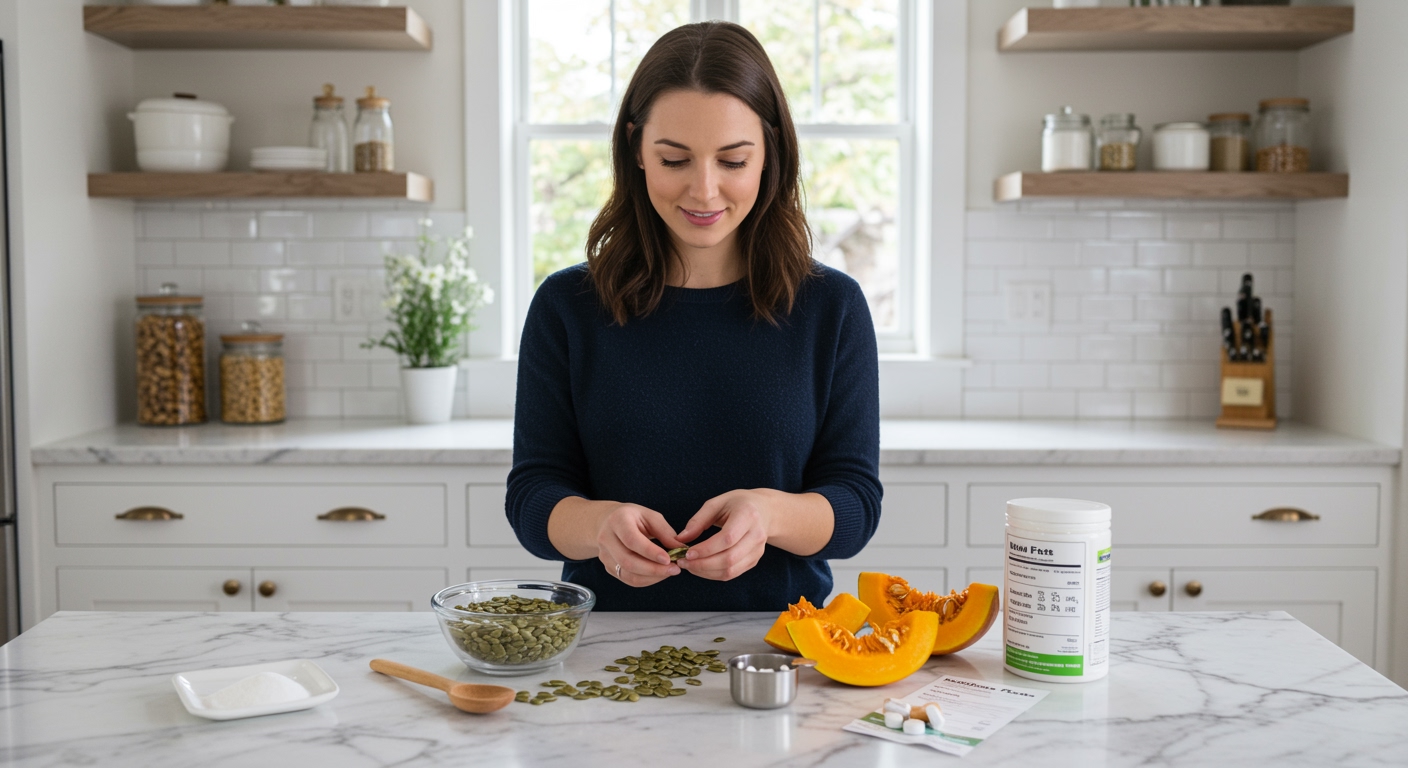✪ Key Takeaway: Ginkgo biloba shows limited evidence for improving PCOS circulation issues and may interact with medications.
Introduction
You walk into a health store and see ginkgo biloba promising better blood flow for your PCOS symptoms.
Many women with PCOS struggle with circulation problems like cold hands and feet, and they wonder if this ancient herb could be their answer.
Hi, I’m Abdur, your nutrition coach and today I’m going to explain whether ginkgo biloba actually helps PCOS circulation issues based on current scientific evidence.
What Makes PCOS Circulation Different?
PCOS affects your blood vessels in ways that go beyond what most people realize.
High insulin levels cause your blood vessels to become less flexible and more prone to inflammation.
This insulin resistance creates a cascade effect where your body produces more inflammatory markers that damage blood vessel walls.
Your endothelium (the inner lining of blood vessels) becomes less able to produce nitric oxide, which normally helps vessels relax and improve blood flow.
Many women with PCOS also have elevated androgen levels that can further compromise circulation by affecting how blood vessels respond to hormonal signals.
✪ Fact: Women with PCOS have a 40% higher risk of developing cardiovascular problems compared to women without PCOS.
How Does Ginkgo Biloba Work In Your Body?
Ginkgo biloba contains flavonoids and terpenoids that theoretically improve blood flow by affecting multiple pathways.
The flavonoids act as antioxidants that may protect blood vessels from damage caused by free radicals.
Terpenoids like ginkgolides can reduce platelet aggregation, which means your blood becomes less sticky and flows more easily.
Some studies suggest ginkgo may increase nitric oxide production, helping blood vessels relax and widen.
However, the concentration of active compounds varies dramatically between different ginkgo products, making consistent effects difficult to achieve.
Your liver processes ginkgo compounds differently based on your genetics, age, and other medications you might be taking.
✪ Pro Tip: Look for standardized ginkgo extracts containing 24% flavonoids and 6% terpenoids for more consistent effects.
What Does Research Say About Ginkgo And PCOS?
Direct research on ginkgo biloba for PCOS circulation is surprisingly limited and shows mixed results.
Most studies focus on ginkgo for general circulation problems in older adults rather than hormonal conditions like PCOS.
A few small studies suggest ginkgo might help with peripheral circulation, but these studies did not specifically include women with PCOS.
The antioxidant effects of ginkgo may theoretically help reduce inflammation associated with PCOS, but clinical evidence remains weak.
Some research indicates that ginkgo might interfere with blood sugar control, which could worsen insulin resistance in women with PCOS.
Large-scale reviews conclude that ginkgo shows no significant benefit for most circulation-related conditions when compared to placebo.
✪ Note: The FDA has not approved ginkgo biloba for treating any medical condition, including circulation problems.
Are There Safety Concerns With Ginkgo For PCOS?
Ginkgo biloba can interact with several medications commonly prescribed for PCOS management.
It may increase bleeding risk when combined with blood thinners or even common pain relievers like aspirin.
Women taking metformin for PCOS should be cautious because ginkgo might affect blood sugar levels unpredictably.
Some people experience headaches, dizziness, or stomach upset when taking ginkgo supplements.
The quality of ginkgo supplements varies widely, and some products may contain contaminants or inconsistent amounts of active ingredients.
Pregnant women with PCOS should avoid ginkgo completely due to potential risks to fetal development.
✪ Pro Tip: Always consult your doctor before adding ginkgo to your PCOS management plan, especially if you take any medications.
What Works Better For PCOS Circulation?
Evidence-based approaches for improving PCOS circulation focus on addressing the root causes rather than quick fixes.
Regular exercise improves insulin sensitivity and directly enhances blood vessel function in women with PCOS.
A balanced diet low in processed foods helps reduce inflammation and supports healthy blood vessel function.
Managing stress levels through techniques like meditation or yoga can improve circulation by reducing cortisol and inflammatory markers.
Omega-3 fatty acids from fish or supplements have stronger evidence for supporting cardiovascular health in PCOS than ginkgo.
Getting adequate sleep helps regulate hormones that directly affect blood vessel health and insulin sensitivity.
✪ Fact: Just 30 minutes of daily walking can improve circulation more effectively than most supplements for women with PCOS.
The Bottom Line
Ginkgo biloba shows limited scientific evidence for improving circulation issues specifically related to PCOS, and safer alternatives exist.
Real health improvements come from addressing root causes, not chasing supplement promises.
I encourage you to share your experiences with circulation issues and PCOS in the comments below, and let me know what questions you have about evidence-based approaches to managing your symptoms.
References
At NutritionCrown, we use quality and credible sources to ensure our content is accurate and trustworthy. Below are the sources referenced in writing this article:
- PMC: Ginkgo biloba extract in cardiovascular disease
- Healthline: 12 Benefits of Ginkgo Biloba
- PMC: PCOS and cardiovascular disease
- Mayo Clinic: PCOS diagnosis and treatment





